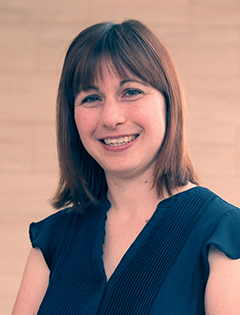Barbara Bailus, PhD
Barbara Bailus joined KGI in 2020 with an expertise in genetics and genetic engineering. Born and raised in Northern California, she completed both her bachelors and doctoral studies at University of California, Davis. Before beginning her doctoral studies, she worked at Cytograft Tissue Engineering as part of the team that pioneered the first human autologous vein implants, grown from a patient’s own cells. While working in industry, she discovered a passion for teaching and discovery science. Her doctoral work in Dr. David Segal’s lab focused on genetic engineering for Angelman Syndrome, a rare neurodevelopmental disorder. She received her doctorate in 2014, her dissertation focused on a gene engineering protein that could be injected peripherally and cross the blood brain barrier.
Following her doctoral research, she wanted to focus on neurodegeneration, joining the laboratory of Dr. Lisa Ellerby located at The Buck Institute for Research on Aging in Marin County (just north of San Francisco). Her research at The Buck Institute focused on potential therapies for Huntington’s disease including small molecules and gene editing proteins. She currently holds two patents on protein delivery mechanisms. Her current research interests include gene editing, genetic diseases, Angelman Syndrome, Huntington’s disease, and neurodevelopmental and neurodegenerative diseases.
Bailus has a passion for teaching the next generations of scientists and communication exciting scientific advances to the public. She has previously organized career seminar series that helped expose young scientists to the amazing array of possible scientific career options, helping them reach their full potential. Serving as a scientific ambassador for The Buck Institute, she has given dozens of public science talks and mentors young scientists in communication skills. She looks forward to continuing these efforts at KGI.
As a recognized expert on Angelman Syndrome, Bailus serves as a scientific adviser for The Foundation for Angelman Syndrome Therapeutics. She also serves as the organizations Chief Scientific Communications Reporter, disseminating complex scientific research to the Angelman Syndrome community.
Pyles B., Bailus B.J., O’Geen H., Segal D.J. Purified Protein Delivery to Activate an Epigenetically Silenced Allele in Mouse Brain. In: Jeltsch A., Rots M. (eds) Epigenome Editing. Methods in Molecular Biology, vol 1767. 2018, Humana Press, New York, NY PMID: 29524138
B.J. Bailus, N. Zhang, L.M. Ellerby, Using Genome Engineering to Understand Huntington’s Disease, Genome Editing in Neuroscience, Foundation IPSEN, 2016. PMID: 31314441
B.J. Bailus, B. Pyles, M. M. McAlister, H. O’Geen, S.H. Lockwood, A. N. Adams, J. T. T. Nguyen, A. Yu, R.F. Berman, D.J. Segal, Protein Delivery of Artificial Transcription Factor Restores Widespread Ube3a Expression in an Angelman Syndrome Mouse Brain, Molecular Therapy, 2016, 24:3 PMID: 26727042
K. Ring, M C. An, N. Zhang, R.N. O’Brien, F. Gao, R. Atwood, B. Bailus, S. Melov, S.Mooney, G. Coppola, L.M. Ellerby, Genomic Analysis Reveals Disruption of Striatal Neuronal Development and Therapeutic Targets in a Human Neural Stem Cell Model of Huntington’s Disease, Stem Cell Reports, 2015, 5:6 PMID: 26651603
B. J. Bailus and D. J. Segal, The Prospect of molecular therapy for Angelman syndrome and other monogenic neurologic disorders, BMC Neuroscience, 2014, 15:76 PMID: 24946931
